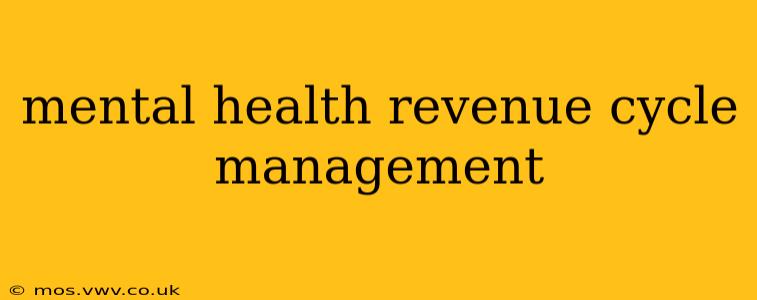The mental health landscape is evolving rapidly, demanding efficient and effective revenue cycle management (RCM) to ensure the financial stability of behavioral healthcare providers. This isn't simply about billing and collecting; it's about optimizing the entire patient journey from initial contact to final payment, ensuring both patient satisfaction and provider profitability. This comprehensive guide explores the intricacies of mental health RCM, highlighting key challenges and offering solutions for improved financial performance.
What are the Key Challenges in Mental Health Revenue Cycle Management?
Mental health RCM presents unique challenges compared to other healthcare specialties. The complexity of insurance coverage, varying patient needs, and the sensitive nature of mental health services all contribute to the difficulty. These challenges can significantly impact a practice's bottom line if not properly addressed.
High Rates of Uninsured and Underinsured Patients
Many individuals seeking mental healthcare lack adequate insurance coverage, leading to higher rates of uncompensated care. This requires robust strategies for managing self-pay patients and negotiating payment plans while ensuring access to care remains equitable.
Complex Insurance Reimbursement Processes
Navigating the complexities of insurance reimbursements for mental health services can be a significant hurdle. Different payers have varying requirements and reimbursement rates, demanding meticulous attention to detail in coding, documentation, and claims submission. Incorrect coding or incomplete documentation can lead to claim denials and revenue loss.
Managing Patient No-Shows and Cancellations
Missed appointments and last-minute cancellations are common in mental health settings, impacting revenue and provider scheduling. Effective appointment scheduling, patient communication strategies, and proactive follow-up are crucial to minimize these losses.
Maintaining Accurate and Compliant Documentation
Thorough and accurate clinical documentation is vital for successful claims processing and reimbursement. Mental health providers must adhere to strict regulations and coding guidelines to ensure compliance and avoid penalties. This documentation needs to support medical necessity and justify the services provided.
How Can Mental Health Providers Improve Their Revenue Cycle Management?
Implementing a robust RCM strategy tailored to the specific needs of mental health practices is paramount. This involves leveraging technology, optimizing workflows, and focusing on patient communication and engagement.
Investing in Mental Health RCM Software
Specialized mental health RCM software can streamline administrative tasks, automate processes, and improve efficiency. This can help manage claims, track payments, and generate reports, reducing manual effort and human error. Features such as integrated electronic health records (EHRs) and automated billing systems are especially valuable.
Streamlining the Patient Intake and Verification Process
A well-defined patient intake process ensures accurate insurance verification and patient registration, minimizing delays and errors in billing. This should involve pre-registration forms, automated insurance verification tools, and a system for handling patient financial responsibility upfront.
Implementing Effective Denial Management Strategies
Prompt identification and resolution of claim denials are critical for maximizing revenue. This involves a robust system for tracking denials, analyzing their causes, and implementing corrective measures to prevent future occurrences. Regularly reviewing denial trends and implementing appropriate strategies is key.
Improving Patient Communication and Engagement
Open and proactive communication with patients is vital for improving financial performance. Clear explanations of insurance coverage, payment options, and billing processes can reduce patient confusion and increase the likelihood of timely payments. Employing patient portals and online billing systems can enhance this communication.
Strengthening Staff Training and Education
Investing in training for staff involved in RCM processes is crucial for maximizing efficiency and minimizing errors. Regular updates on changes in insurance regulations, coding guidelines, and billing procedures are essential to maintain compliance and optimize revenue capture.
What are the Best Practices for Mental Health Revenue Cycle Management?
Implementing best practices ensures efficient and effective RCM, maximizing revenue and minimizing losses. Key strategies include:
- Regularly review key performance indicators (KPIs): Tracking metrics like days in accounts receivable, claim denial rates, and patient payment collection rates helps to identify areas needing improvement.
- Employ a dedicated RCM team: A dedicated team with expertise in mental health billing and coding can improve accuracy and efficiency.
- Embrace technology: Utilize EHRs, practice management software, and online payment portals to streamline processes and reduce manual work.
- Stay compliant: Keep abreast of changes in regulations and guidelines to maintain compliance and avoid penalties.
- Prioritize patient communication: Clear and consistent communication with patients reduces confusion and improves payment collection rates.
By adopting these strategies and addressing the unique challenges of mental health RCM, providers can strengthen their financial health and continue to provide high-quality care to their patients. A well-managed revenue cycle is not just a financial necessity; it's a crucial component of providing sustainable and accessible mental healthcare.
